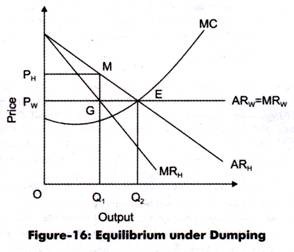When a monopolist sells products at higher price in the home market and lower prices in the international market, it is called dumping.
It is a special form of price discrimination in which an organization sells its products at a price that is lower than the original price to get rid of the excess inventory.
Dumping is done in case of international trade in which an organization exports its products at a price lower than the price it charges in its own country. In such a situation, the sales volume and market share of the organizations operating in other countries may reduce. The losses which are incurred in the international markets are compensated in home markets.
A monopolist has following motives for dumping:
ADVERTISEMENTS:
i. To dispose an excess stock produced due to wrong judgment of demand
ii. To develop new trade relations with countries
iii. To benefit from economies of scale
iv. To drive competitors out of the foreign market
ADVERTISEMENTS:
The concept of dumping can be explained with the help of Figure-16:
In Figure-16,
ARH = Average revenue in home market
ADVERTISEMENTS:
MRH = marginal revenue in home market
ARW = MRW = Foreign market demand curve
PH = Price in home market (monopoly price)
PW = Price in world market (competitive price)
In Figure-16, an assumption is taken that there are two markets that is domestic market (home market) and foreign market (world market) faced by an organization. In domestic market, the organization enjoys monopoly, whereas in foreign market, the organization faces perfect competition. Monopolist is in equilibrium when profits are maximum that is when MR=MC.
In Figure-16, the equilibrium is achieved at point E, with quantity as OQ2, out of which OQ1 is sold in home market at PH price and Q1Q2 is sold at price PW in world market. The price charged in world market is lower than the price charged in the home market.
Dumping is a kind of predatory pricing in which a foreign organization charges high prices and earns profits in its own country and uses these profits to sell the products at lower prices to build market share in other countries.
According to World Trade Organization, dumping should be condemned, if it is harming an established industry in a particular market. Thus, every country has an anti-dumping policy, which levies the duties that must be paid by organizations; if they engage in dumping. Anti-dumping duties act as measures that help in reducing the impact of dumping on domestic producers.
Anti-dumping policies differ from country to country. According to China, dumping is a subsidization of exports resulting in substantial injury or the threat of substantial injury, to an established domestic industry’, or substantially impeding the establishment of a comparable domestic industry. According to US, dumping occurs if the products are priced only minimally above cost, or at prices below those charged in the producing country.
ADVERTISEMENTS:
Anti-dumping duties are similar to countervailing duties imposed on subsidized products imported into a country.
